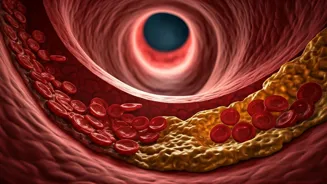The Sneaky Culprits
The initial focus is on foods that often masquerade as healthy choices but can quietly contribute to arterial issues. For instance, processed meats like
bacon and sausages, though convenient, are loaded with saturated fats and sodium, both enemies of a healthy heart. The article also points out the dangers of foods high in added sugars, such as sweetened yogurts and cereals, which can increase the risk of inflammation and plaque buildup in the arteries. Certain cooking oils, particularly those high in saturated fats like coconut oil, should also be consumed sparingly. Ready-made baked goods often contain high levels of unhealthy fats and sugars, making them another item to watch out for. This section emphasizes the importance of reading labels and understanding what constitutes a balanced diet to maintain heart health.
Dairy Dilemma Unveiled
Dairy products, particularly those high in fat, are another area of concern. Whole milk, cheese, and ice cream, while sometimes enjoyed, can contribute significantly to saturated fat intake. Excessive saturated fat can elevate LDL cholesterol levels, a major risk factor for arterial blockages. The article suggests opting for low-fat or non-fat dairy alternatives to reduce this risk. Another commonly consumed food, often seen as healthy, is granola, which frequently contains added sugars, unhealthy oils, and nuts, thus making it a high-calorie option. Therefore, moderation, and the careful selection of low-sugar versions are key. This section highlights the need for mindful consumption of dairy and granola to ensure heart health.
Hidden Sugar Dangers
The spotlight is turned on foods that are often laden with added sugars, which can be particularly harmful to cardiovascular health. Sugary drinks, including sodas, fruit juices, and sweetened teas, can lead to increased blood sugar levels, potentially causing inflammation and damage to blood vessels. The article advises against consuming these beverages regularly and suggests water or unsweetened alternatives instead. Breakfast cereals, often marketed as healthy choices, also contain high levels of added sugars, which can have a similar impact. Furthermore, excessive consumption of processed snacks such as candy bars and cookies can dramatically increase sugar intake. This section underscores the need to limit added sugars in one's diet to protect arterial health.
Snack Time Pitfalls
This section shifts attention to the risks of unhealthy snack choices that can negatively affect arterial health. Processed snacks like chips and crackers often contain high levels of sodium and unhealthy fats, which can contribute to artery blockages. Packaged microwave popcorn may seem like a healthier choice, but it can be loaded with sodium and unhealthy additives, making it a potentially detrimental snack. The article emphasizes the importance of carefully examining the ingredients and nutritional information on snack packaging. Healthier snack alternatives, such as fresh fruits, vegetables, and unsalted nuts, are suggested to make a positive contribution to cardiovascular health. This section stresses the need for informed snack choices to support a healthy heart.
Navigating Oils and Fats
A crucial aspect of heart health is understanding the role of oils and fats in the diet. Some cooking oils, like coconut oil, which are often promoted as healthy, are high in saturated fats. High consumption of saturated fats can increase LDL cholesterol levels, thereby increasing the likelihood of artery blockages. Deep-fried foods, cooked in unhealthy oils, are equally concerning due to their high-fat content. The article recommends opting for heart-healthy fats, such as olive oil or avocado oil, and emphasizes methods like baking, grilling, or steaming food instead of deep frying. This section stresses the significance of choosing the right types of oils and fats for arterial health.
Refined Grains vs. Whole
The discussion turns towards the types of grains consumed and their impact on arterial health. White bread, white rice, and other refined grains lack the fiber and nutrients found in whole grains. Excessive consumption of refined grains can lead to blood sugar spikes, contributing to inflammation and potentially harming blood vessels. The article recommends choosing whole-grain alternatives, such as whole-wheat bread, brown rice, and quinoa. These options contain more fiber and nutrients, which aid in maintaining healthy blood sugar levels and supporting arterial health. This section underscores the importance of selecting whole grains to help protect your arteries.
Restaurant Food Risks
Eating out regularly presents numerous challenges to heart health. Restaurant meals often contain high amounts of sodium, unhealthy fats, and added sugars. Large portion sizes, which are common, can also contribute to overeating and increased caloric intake. Fried foods and dishes with creamy sauces are particularly risky. The article advises caution when dining out, urging diners to make healthier choices, such as grilled rather than fried options, and to request sauces and dressings on the side. This section stresses the need for awareness and smart choices when consuming food outside the home to maintain a healthy heart.
Portion Control Matters
Regardless of the food choices, the amount consumed plays a critical role in arterial health. Consuming excessive quantities of even relatively healthy foods can lead to weight gain, placing undue stress on the cardiovascular system. The article emphasizes the value of portion control to prevent overeating and excessive caloric intake. Using smaller plates, measuring food portions, and paying attention to hunger cues are all useful strategies. Also, slowing down while eating can promote better awareness of fullness and avoid overconsumption. This section highlights the importance of mindful eating habits to ensure arterial health.
Beverage Choices Evaluated
This section concentrates on beverages beyond sugary drinks, and examines other potentially problematic drinks. Alcohol consumption, when excessive, can lead to increased blood pressure and can increase triglyceride levels, both of which can negatively impact arterial health. Even seemingly healthy beverages, like some fruit smoothies, can contain high amounts of added sugars and calories. The article advocates for moderation in alcohol consumption and suggests water, herbal teas, and unsweetened beverages as alternatives. This section emphasizes that careful selection of drinks can play a substantial role in maintaining a healthy heart.
The Healthier Path Forward
Concluding the article, this section sums up strategies for maintaining and enhancing arterial health through dietary modifications. The key is to prioritize whole, unprocessed foods, like fruits, vegetables, whole grains, and lean proteins. Limiting the intake of saturated and trans fats, added sugars, and sodium is vital. Incorporating regular physical activity and maintaining a healthy weight are also essential for overall cardiovascular well-being. Reading food labels, understanding nutritional information, and making informed choices can help. The article stresses the significance of adopting a balanced diet and lifestyle to effectively reduce the risk of arterial blockages and support a healthy heart.




















